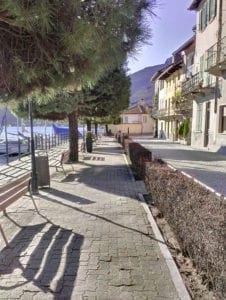Pella, the history and architectural treasures of this village in the Verbano-Cusio-Ossola Province
Pella, a small but charming village overlooking Lake Orta, is rich in history with artistic and architectural charm.
Pella is a charming village on the western shore of Lake Orta. It is one of the oldest towns in Cusio territory and rich in history. Pella, in fact, has an important historical legacy, during which it was ruled by both the Episcopates and the Savoy family. So, what are Pella’s historical roots? And what’s there to see in this peculiar little Italian village?
Pella, exploring the village’s historical heritage
Starting in the 10th century, the village of Pella was part of diocesan jurisdiction. A fundamental event to remember in the history of this charming village is the resistance to the invasion of Cesare Maggio, the Captain of Charles V, Holy Roman Emperor and King of Spain, in 1529. In this occasion, the defense system that was present since the Middle Ages proved to be more efficient, and today the only visible remains are that of a tower.
The House of Savoy later acquired Pella in 1767. During this period the village shared with other areas in the same territory, the economic growth provided by the specialized artisan skills involving canvases made from hemp as well as the manufacturing of taps and fittings. One of the most significant historical contributions to Pella was that of the stonemasons who work with granite. These individuals have been honored by the Monumento agli Scalpellini (Stone Mason Monument), found in Alzo along with a 3-kilometer trail leading to the Santuario della Madonna del Sasso. This is where the Museo dello Scalpellino is located. Here, visitors get the chance of learning about these difficult and dangerous work carried out by the stone masons thanks to the display of tools, artifacts and documents.
What’s there to see in Pella?
In the small village of Pella, along what was once the route of the stonemasons, was found the Masso coppellato (a stone with carved cup and ring marks), a discovery dating back to the Iron Age of great archaeological importance. The historical and cultural tradition of Pella is also symbolized by the tettoia-lavatoio or covered wash-house, used by the women of Pella to wash their laundry when it wasn’t possible to reach the lake because of rain and storms, but also for storing water coming from the Pellino creek.
On a religious note, the Chiesa Parrocchiale, dedicated to Sant’Albino Vescovo, is also worthy of a visit during a tour of Pella. Built in 1591, as evidenced by the granite lintel above the entrance door, this building has undergone several renovations, such as the expansion of the nave, the addition of the portico at the entrance and the creation of a mosaic floor in the presbytery and choir. The renowned stonemasons also took part in the construction of the new bell tower in 1936 and built with granite boulders from the Alzo quarry.
A few steps from the Chiesa Parrocchiale di Sant’Albino is the Ponte sul Pellino. It is an age-old humpbacked structure, or rather a bridge crossing the river with an arch as wide as possible, typical of Medieval traditions. At that time, this architectural masterpiece was the only link between the ancient San Rocco cemetery and the village; funeral processions would pass over it after ceremonies were held in the Chiesa Parrocchiale.
Another Chiesa or church worth visiting in Pella is the Chiesa Parrocchiale di San Giovanni Battista situated in the splendid Piazza di Alzo. Built starting in 1589, the edifice has a single nave and four side chapels. The most distinguishing characteristic of this church is its woodworking, which has undergone numerous expansions and renovations over time.








